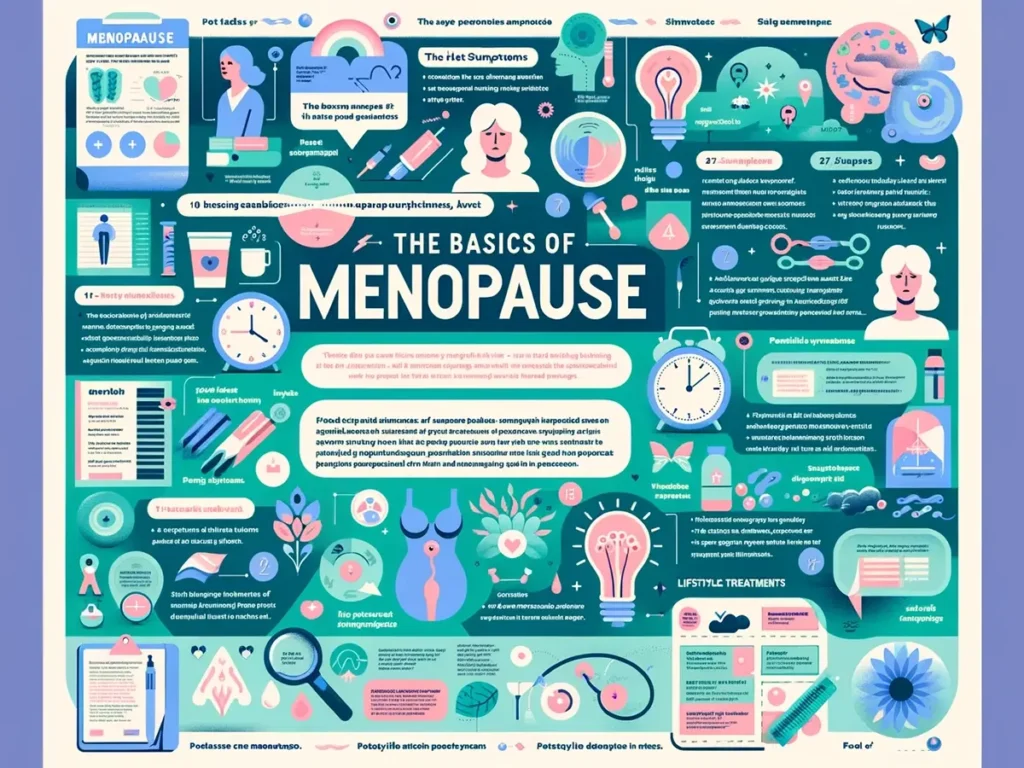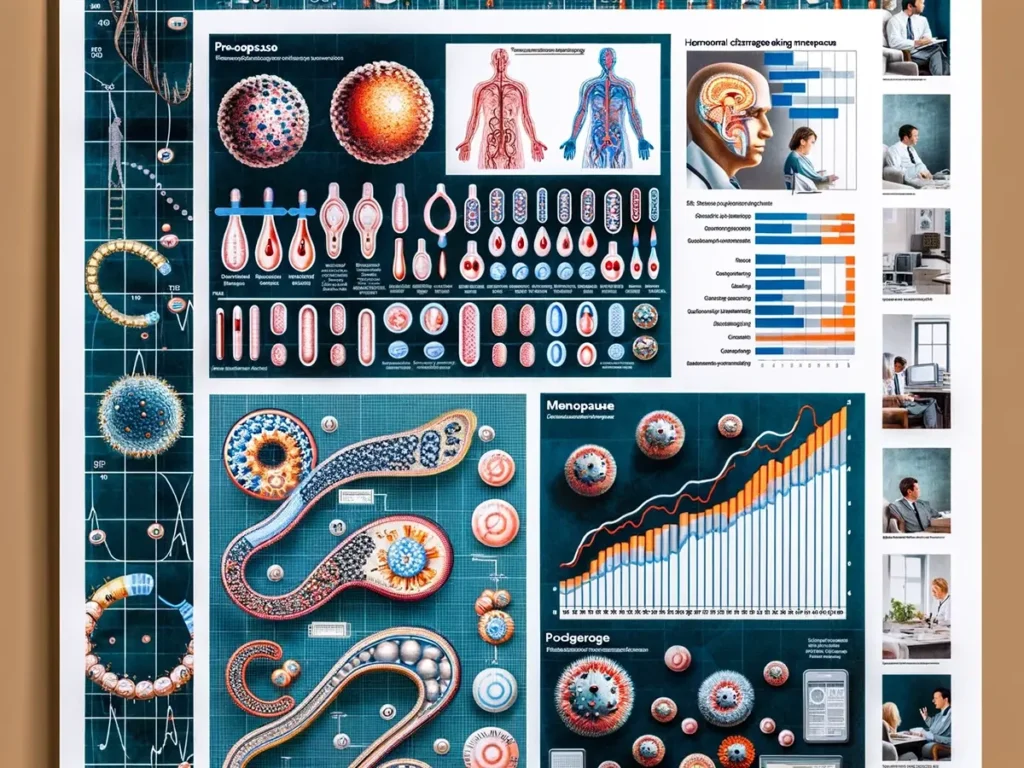Unraveling the mysteries surrounding menopause has been a subject of extensive research and debate in the medical field. As the transformative process that marks the end of a woman’s reproductive years, menopause brings about various physical and hormonal changes. However, recent scientific breakthroughs have sparked curiosity and discussion about the possibility of reversing this natural biological phenomenon.
Key Takeaways:
- Current research suggests that it may be possible to reverse menopause using stem cell technology.
- Scientists have successfully rejuvenated ovaries in menopausal women, leading to restored hormone levels and menstrual cycles.
- This groundbreaking research offers hope for women looking to extend their fertility and potentially delay the onset of menopause.
Historical Perspective on Menopause
Now, let’s delve into the historical perspective on menopause to understand how this natural phase of a woman’s life has been viewed and managed throughout different time periods.
Menopause Through the Ages
For centuries, menopause has been a topic of both curiosity and mystery. In ancient times, menopause was often associated with a loss of femininity or perceived as a curse. Women going through menopause were sometimes shunned or ostracized, contributing to the stigma surrounding this natural transition. It wasn’t until the 20th century that menopause began to be more openly discussed and researched, leading to advancements in understanding and managing its symptoms.
Throughout history, various remedies and treatments have been concocted to alleviate menopausal symptoms, ranging from herbal remedies to extreme practices. The evolution of our understanding of menopause has come a long way, with modern medicine now offering a wide range of options to help women navigate this phase of life with more comfort and support.
Cultural and Social Impacts of Menopause
Menopause has not only been a biological phenomenon but also a cultural and social one. In many societies, menopause has been associated with a loss of fertility and youth, leading to changes in a woman’s social status or role within her community. It has often been viewed as a turning point in a woman’s life, marking the end of her reproductive years.
Menopause can also impact a woman’s mental and emotional well-being, as she navigates the physical changes and hormonal fluctuations that come with this transition. Cultural beliefs and societal norms can influence how women experience and perceive menopause, highlighting the importance of addressing not just the physical symptoms but also the social and emotional aspects of this life stage.
The Science Behind Menopause
One of the most fascinating aspects of menopause is the intricate science that underpins this natural biological process. Menopause is primarily characterized by a significant decline in the production of key hormones such as estrogen and progesterone, leading to the cessation of menstrual cycles and the onset of various physical and emotional changes.
Hormonal Changes During Menopause
To understand menopause, it is essential to grasp the hormonal fluctuations that occur during this transition. As women age, their ovaries produce fewer hormones, particularly estrogen and progesterone. These hormonal shifts not only affect the reproductive cycle but also have far-reaching effects on other systems in the body, contributing to symptoms such as hot flashes, night sweats, and mood swings.
Furthermore, the decline in estrogen levels during menopause can also impact bone density, leading to an increased risk of osteoporosis. These hormonal changes play a pivotal role in the overall experience of menopause and help explain the diverse array of symptoms that women may encounter during this phase of life.
Physiological and Psychological Effects of Menopause
To delve deeper into the impact of menopause, it is crucial to consider both the physiological and psychological effects that women may experience. Physiologically, menopause can result in symptoms such as vaginal dryness, urinary incontinence, and changes in libido. Additionally, menopausal women may also be at a higher risk of cardiovascular issues and weight gain.
A multidimensional perspective is essential when examining menopause, as the psychological effects can be just as profound as the physiological ones. Many women report feelings of anxiety, depression, and decreased self-esteem during this period of transition. Understanding the holistic impact of menopause is key to developing comprehensive strategies to support women through this transformative phase of life.
Pioneering Research in Menopause Reversal
To delve into the revolutionary idea of reversing menopause, it is essential to explore the pioneering research that has laid the foundation for this groundbreaking concept. Scientists and researchers around the world have been conducting studies and experiments to unravel the mysteries of menopause and discover potential ways to reverse its effects.
Early Studies and Experiments
Menopause has long been considered an irreversible biological process, marking the end of a woman’s reproductive years. However, early studies and experiments conducted on animal models have shown promising results in terms of potential interventions to reverse menopause. Researchers have been exploring various hormonal therapies, stem cell treatments, and genetic modification techniques to rejuvenate reproductive function in animals that have undergone menopause.
An increasing focus on regenerative medicine and the role of stem cells in tissue repair and regeneration has opened up new possibilities for menopause reversal. Scientists are studying the potential of stem cell therapies to restore ovarian function and hormonal balance in postmenopausal women, offering a glimpse of hope for those seeking to regain their fertility and hormonal health.
Current Breakthroughs and Developments
To further advance the field of menopause reversal, ongoing research is focusing on understanding the underlying mechanisms of menopause and identifying key targets for intervention. Recent breakthroughs in the field have highlighted the potential of novel gene-editing technologies, such as CRISPR-Cas9, to manipulate genes associated with reproductive aging and menopause. These cutting-edge tools offer a promising avenue for precise genetic interventions that could potentially reverse the effects of menopause.
Techniques Explored for Menopause Reversal
Hormone Replacement Therapy (HRT)
After the onset of menopause, hormone levels, particularly estrogen and progesterone, decrease significantly in a woman’s body. Hormone Replacement Therapy (HRT) is a popular technique explored for menopause reversal. This therapy involves the administration of synthetic hormones to mimic the hormonal levels that were present before menopause. By supplementing the body with these hormones, HRT aims to alleviate menopausal symptoms and potentially reverse some of the biological effects associated with menopause.
Although HRT has shown effectiveness in managing symptoms like hot flashes and vaginal dryness, there are ongoing debates regarding its long-term risks, such as an increased risk of breast cancer and cardiovascular diseases. Women considering HRT for menopause reversal should have a thorough discussion with their healthcare provider to assess the benefits and risks based on their individual health profile.
Ovarian Rejuvenation
For women exploring options beyond traditional hormone therapy, Ovarian Rejuvenation is a cutting-edge technique being researched for menopause reversal. This approach involves stimulating the ovaries to produce viable eggs through various methods, such as platelet-rich plasma (PRP) injections, stem cell therapy, or even ovarian tissue transplantation. By rejuvenating the ovaries, researchers aim to restore hormonal balance, potentially reversing menopause.
Rejuvenation of the ovaries through techniques like Ovarian Rejuvenation is still in the experimental stage, with limited clinical evidence to support its efficacy and safety. As research in this area progresses, more insights are expected to emerge regarding the feasibility and long-term outcomes of using such methods for menopause reversal.
Genetic and Molecular Approaches
Genetic and Molecular Approaches are another avenue being explored for menopause reversal. By targeting specific genes or molecular pathways responsible for reproductive aging, researchers aim to develop interventions that can slow down or even reverse the process of menopause. Techniques like gene editing, telomerase activation, and senolytics are some of the strategies being investigated in this field to potentially rejuvenate the reproductive system and delay menopause.
Explored as a futuristic possibility, Genetic and Molecular Approaches for menopause reversal hold promise but also raise ethical and safety concerns due to the complexity and long-term implications of altering genetic and molecular processes. As research advances, a deeper understanding of these approaches and their potential impact on menopause reversal will continue to evolve.
Ethical, Legal, and Social Considerations
Your journey into the realm of menopause reversal research must consider the ethical, legal, and social implications surrounding such revolutionary advancements. These pillars of consideration will play a vital role in shaping the future landscape of menopause treatments.
The Morality of Menopause Reversal
The concept of reversing menopause raises important ethical questions surrounding the natural progression of life. While some may argue that interfering with the natural process of menopause goes against the course of nature, others may view it as a way to empower individuals with more choices over their bodies and reproductive health. The discussion around the morality of menopause reversal is nuanced and requires careful consideration of various perspectives.
The decision to explore menopause reversal treatments also brings to light concerns about the potential risks and long-term effects on an individual’s health and well-being. As researchers delve deeper into this field, ethical guidelines and regulations will need to be established to ensure that any developments in menopause reversal are conducted with the highest standards of patient safety and informed consent.
Legal Implications of Reversal Treatments
On the legal front, the introduction of menopause reversal treatments may spark debates around issues such as reproductive rights, insurance coverage, and medical regulations. These treatments may challenge existing laws and policies surrounding reproductive health and age-related medical interventions. It is essential for lawmakers and policymakers to stay informed and adapt regulations to accommodate the evolving landscape of menopause treatments.
Considerations surrounding the legal implications of menopause reversal treatments will involve navigating complex legal frameworks to ensure that individuals have access to safe and regulated options. As the field continues to advance, legal protections must be put in place to safeguard patients’ rights and ensure the ethical practice of menopause reversal treatments.
Societal and Personal Impact
Treatments that could potentially reverse menopause have the potential to significantly impact society’s perception of age, health, and reproductive choices. The societal implications of menopause reversal treatments may lead to new discussions and challenges regarding gender roles, family planning, and the concept of aging. It is crucial to consider the broader societal implications and engage in open dialogue to address concerns and opportunities that may arise.
On a personal level, the decision to pursue menopause reversal treatments is deeply individual and may have profound effects on one’s self-identity and life trajectory. Individuals exploring these treatments should be supported with comprehensive information, counseling, and resources to make informed decisions that align with their values and well-being.
The Future of Menopause Research
Potential for Advancements in Reversal Techniques
For researchers in the field of menopause, the future holds promise for advancements in reversal techniques. With ongoing studies and clinical trials, there is growing interest in developing innovative strategies to potentially reverse the effects of menopause. Scientists are exploring various approaches, such as hormone therapies, stem cell research, and genetic interventions, to uncover new ways to restore ovarian function and hormonal balance in menopausal women.
Future research may lead to the discovery of novel treatments that could not only alleviate menopausal symptoms but also potentially reverse the biological process of menopause itself. As our understanding of the mechanisms underlying menopause deepens, there is hope that targeted interventions could one day enable women to regain fertility and hormonal levels reminiscent of their premenopausal years.
The Role of AI and Machine Learning in Menopause Research
An increasingly prominent player in menopause research is artificial intelligence (AI) and machine learning. These technologies are revolutionizing the way data is analyzed, patterns are identified, and predictions are made in the realm of menopause. By leveraging AI algorithms, researchers can sift through vast amounts of data more efficiently to uncover new insights into the complex biological processes involved in menopause.
AI and machine learning have the potential to accelerate the pace of discovery in menopause research by assisting in the identification of relevant biomarkers, predicting treatment outcomes, and personalizing interventions based on individual patient profiles. As these technologies continue to evolve, they are likely to play a crucial role in expanding our knowledge of menopause and paving the way for innovative treatment approaches.
Artificial intelligence and machine learning have the capacity to revolutionize menopause research by facilitating a deeper understanding of the intricate interactions between hormones, genes, and environmental factors that influence the menopausal transition. By harnessing the power of these cutting-edge technologies, researchers can uncover hidden patterns and relationships within large datasets that may hold the key to unlocking new therapeutic avenues for managing menopausal symptoms and potentially reversing the effects of menopause.
Summing up
Drawing together the findings from our exploration of revolutionary research on reversing menopause, we see that while promising strides have been made in understanding the complexities of this biological process, the ability to fully reverse menopause remains elusive. Despite recent advancements in regenerative medicine and hormone therapy, the fundamental biological changes that occur during menopause are difficult to reverse once they have taken place. However, ongoing research in this field continues to offer hope for potential breakthroughs in the future.
FAQ
Q: What is menopause?
A: Menopause is a natural biological process that marks the end of a woman’s menstrual cycles and fertility.
Q: What are the common symptoms of menopause?
A: Common symptoms of menopause include hot flashes, night sweats, mood swings, vaginal dryness, and sleep disturbances.
Q: Is it possible to reverse menopause?
A: Currently, there is no scientific evidence to support the reversal of menopause. It is a natural and irreversible process.
Q: What is revolutionary research related to menopause reversal?
A: There is ongoing research on regenerative medicine and stem cell therapy that may offer potential treatments to alleviate menopausal symptoms, but full reversal remains unproven.
Q: What are some effective ways to manage menopausal symptoms?
A: Some ways to manage menopausal symptoms include hormone replacement therapy, healthy lifestyle changes, stress reduction techniques, and alternative therapies such as acupuncture and herbal supplements.






